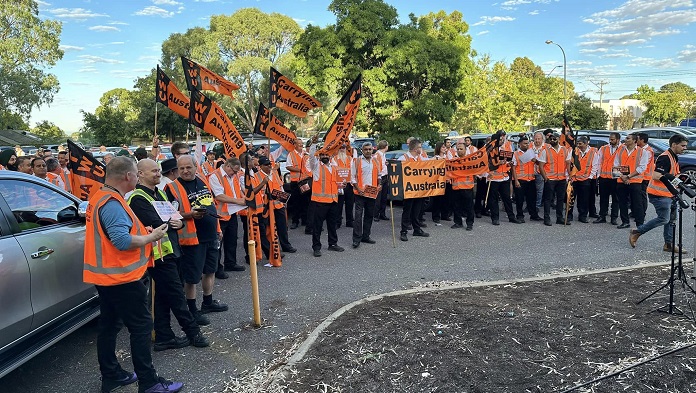“Today is just the start of the largest industrial campaign that we’ve seen in South Australia since the 70s,” announced Ian Smith, secretary of the Transport Workers Union (TWU) SA/NT Branch to a crowd of hundreds of angry bus drivers.
They were gathered to launch a one-day strike on 9 January that saw depots picketed, and brought most public buses to a standstill, around Adelaide.
Smith explained: “What we’re seeing here today is a demonstration of 20 years of privatisation gone wrong. Not only has safety been down the drain, drivers’ conditions and their wages have been taken away as well.”
The union released results of a drivers’ survey showing 49 per cent had been physically assaulted at work. Some 91 per cent had been verbally assaulted, including death threats. About 95 per cent think the danger is increasing and 81 per cent will consider leaving if things don’t improve.
Drivers are on a variety of pay rates and many have not seen rises for years. Pay lags considerably behind tram drivers. Meanwhile rosters leave little time for breaks and penalty pay for unsociable hours is lacking.
The drivers are employed by Torrens Transit, a private company. Labor transport minister Tom Koutsantonis criticised the strike, calling on the TWU to be “good corporate citizens” and saying “Good unions don’t see strikes as the first option”.
But the union has been negotiating for six months without success. Shamefully, his transport department helped organise replacement bus services to scab on the strike.
The dispute is a clear demonstration that even with Labor state and federal governments, workers need to take things into their own hands to reverse falling living standards and conditions.
Solidarity initiated a contingent of community supporters at the drivers’ rally, which included activists from Extinction Rebellion and the Anti-Poverty Network.
Buses have a critical role to play in tackling climate change by providing an alternative to private cars. The demands announced by Smith included “an efficient network, so we can stop the congestion that’s happening in South Australia”.
At a time when general union membership has declined dramatically, TWU membership at Torrens Transit remains an impressive 80 per cent, putting the union in a strong position to win.
Smith declared: “We’re going to fight until we’ve got an outcome that’s completely satisfactory.” All of us should give them support, and more unions should follow their example.
By Robert Stainsby






